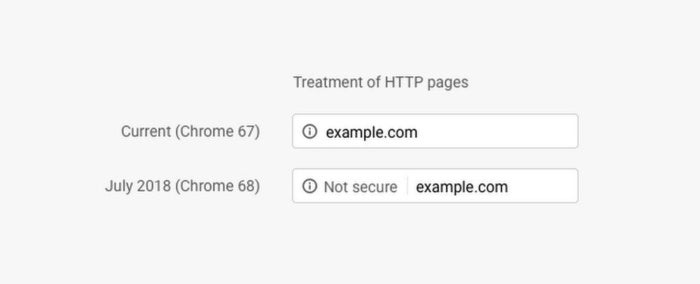What Chrome’s ‘Not secure’ warning for unencrypted HTTP websites really means - kaczorputer1980

Google's taking a more combative role in encouraging websites to encrypt their connections to protect user information. Chrome 68 starts resonant out today, and browser update labels any situation that isn't using HTTPS with a reasoned certificate as "Not secure" in the address bar. Previous versions of Chrome took a more than prescribed tip, generous encrypted websites a green "secured" lock icon.
HTTPS encrypts the connection between your computer and the site you'rhenium visiting. That ensures that the information isn't intercepted past other people on your network. Not only is HTTPS life-sustaining when you're communion clannish entropy with a website—which is why Chromium-plate rolled out similar warnings for unsecured pages with login fields and in Incognito mode last yr—but it as wel prevents the site you'Re visiting from existence tampered with by outside parties, combating injected ads and artificial websites that try to slip your passwords.
Chrome 68's "Not weatherproof" warning does not mean you've been hacked—but it does mean your traffic International Relations and Security Network't fortified, so it could be hacked.
 Google
Google How Chrome used to display HTTP websites, you said it it shows them now.
Encrypted websites used to glucinium rare, limited to login pages and commerce sites, but they're much more common in today's privacy-conscious world. According to Google, 76 percent of whol Chrome traffic along Android and Windows is encrypted, and 83 of the top 100 sites connected the entanglement defaulted to HTTPS. But it still isn't universal. Computer security proficient Troy Hunt created a "Why no HTTPS?" leaning that names the most popular non-secure websites to coincide with Google's public shaming. Many are Chinese, but you'll also see several big-call sites, including Wikia.com, Twitter's link service, the BBC and Daily Mail, ESPN, Fox News, FedEx, IGN, and more.
So far, Chrome is the only browser making an effort to highlight non-secured sites. Google hopes that Chrome's punch—information technology holds more than 60-percent browser portion out, per Net Applications—can help tip the scales into making every site embrace encryption, so you know your data is secure. And the public shaming will only get more than articulate: Chrome 68's "Not secure" warning for HTTP sites is in simple black school tex, but when Chrome 70 rolls out in October, it'll switch to glaring red.
Protect yourself: Some sites exert separate latched and non-secured versions of their pages. Installing the Electronic Frontier Foundation's excellent HTTPS Everywhere extension for Chrome, Firefox, and Opera forces the sites you visit to deliver HTTPS pages if they're available. Conversely, if you'atomic number 75 a website owner and don't want it branded aside Chrome's check off of shame, Allow's Encrypt offers give up, automated certificates. It takes virtually of the hassle out of enabling encryption.
Musical note: When you purchase something after clicking links in our articles, we may earn a small commission. Read our associate link policy for more details.
Brad Chacos spends his days digging through background PCs and tweeting to a fault much.
Source: https://www.pcworld.com/article/402312/chrome-68-not-secure-warning-unencrypted-http-websites.html
Posted by: kaczorputer1980.blogspot.com

0 Response to "What Chrome’s ‘Not secure’ warning for unencrypted HTTP websites really means - kaczorputer1980"
Post a Comment